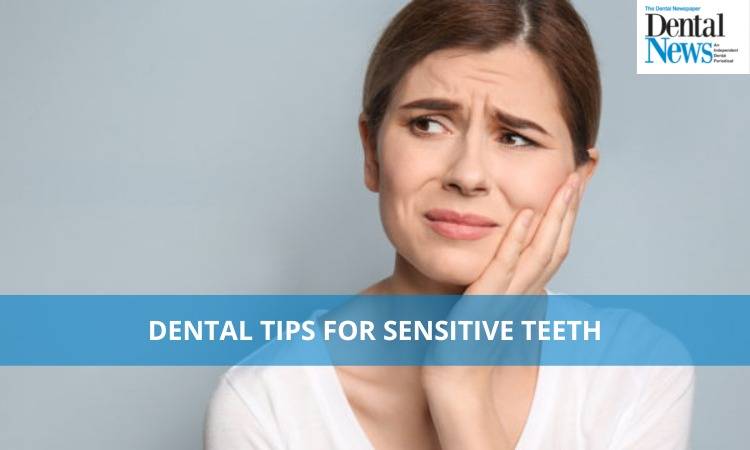
Do you cringe when you consume hot or cold liquids? When you brush or floss, are you cautious because it hurts? You might, then, have sensitive teeth.
If you have sensitive teeth, you've probably felt pain when you bite into anything hot or cold. Extreme sensitivity to heat and cold is a common characteristic of sensitive teeth, which frequently result from excessive stimulation of the dental nerves.
Some of the heat and cold are prevented from reaching sensitive nerves by the outermost layer of teeth, known as tooth enamel. In contrast, the dentin layer beneath the enamel becomes visible when it has been worn down or damaged. Tubules, which are small canals, are seen in dentin. The dental nerves within the tooth's pulp or center are stimulated if a hot or cold substance is consumed with the tubules exposed, which can be painful.
Observe that every patient's response to various treatment modalities and pain management may vary. Try out different combinations of these tooth sensitivity tips to see which ones work best for you. Set a sensitivity control plan for your teeth with the help of a dental professional for the best outcomes.
You can try the following solutions for sensitive teeth:
Consider using desensitizing toothpaste
One method for treating sensitive teeth is desensitizing toothpaste. Desensitizing toothpaste differs from conventional in that it contains ingredients like potassium nitrate and stannous fluoride that lessen sensitivity and shield nerves from unpleasant stimulation. There are many desensitizing products available. Ask your dentist for advice if you're not sure which one to try.
Use desensitizing toothpaste in the same manner as regular toothpaste and brush as usual for optimal effectiveness. It will take a few standard applications before you start to notice any desensitization. Try a different mixture or consult your dentist if you don't feel any relief after a few weeks of regular use.
Utilize only soft toothbrushes
Changing your toothbrush is one simple method for relieving sensitive teeth. Using a toothbrush with hard bristles may be aggravating your issue. The enamel is damaged by stiff bristles and abrasive toothpastes, which eventually causes more small holes and increases sensitivity. Additionally, they might exacerbate gum recession, exposing dentin and irritating sensitive nerves. To protect the surface of your teeth and to keep your gums healthy, use a toothbrush with soft bristles and brush softly.
Use a mouthguard at night
Sometimes teeth grinding while you sleep or are anxious might lead to tooth sensitivity. Similar to brushing too vigorously, grinding your teeth weakens your natural defences against sensitivity and wears down your enamel. If you discover that you clench or grind your teeth, you might want to wear a mouthguard or attempt a different sleeping position.
Treatments with fluoride and dental sealants
In some circumstances, fluoride treatments might aid with slight sensitivity while also strengthening your teeth. This is applying a thin coat of fluoride gel to your teeth, letting it sit for a short period of time, and then wiping it off. Your teeth get stronger due to the fluoride, which also lessens sensitivity.
Dental sealants could be useful as well. They are often placed on the back teeth and are made of a very thin layer of dental resin. In essence, they cover the teeth to shield them from acid, sugar, and oral microbes. In addition to preventing cavities, this significantly lessens tooth sensitivity in treated teeth.
Avoid consuming acidic foods and beverages
Did you know that some foods and drinks can significantly worsen food sensitivity? Yes, to relieve dental sensitivity, some foods and drinks should be consumed in moderation or not at all. So, what should you watch out for? Well, the primary offenders are acidic foods and beverages.
If you suffer from tooth sensitivity, be cautious about what you eat. Pickles, sodas, fruit, pickles, and coffee, among other acidic foods and drinks, can make teeth more sensitive. Avoid eating acidic foods entirely if you've mostly noticed that the shooting pain in your teeth happens while you're doing so. Additionally, minimizing sensitivity can be achieved by avoiding meals and beverages that are frozen or excessively hot.
Make a mouthwash with salt water
Tooth sensitivity can be immediately diminished by making a mouthwash with salt and water. The pH level in the mouth is balanced by salt water, resulting in an alkaline environment that inhibits bacterial growth. Plaque is also diminished during the process. Simply combine two teaspoons of salt with a cup of warm water to create a saltwater rinse. Until sensitivity improves, this rinse should be applied both in the morning and at night.
Have a dentist examine your gums
Diseased or receding gums may significantly influence tooth sensitivity. The areas of teeth with no enamel (below the gum line) become visible as the gum tissue degenerates and recedes from the tooth surface. This partial lack of protection for the nerves might result in excruciating suffering. To ensure you don't have gum disease that needs to be addressed, have your dentist check your gums. Gums that are in good health shield teeth and reduce sensitivity.
Teeth sensitivity can be brought on by a number of various things, including worn enamel, exposed roots, cavities, fissures, and even recent dental treatments. The cause will determine whether you require treatment. You can treat mildly sensitive teeth with the help of desensitizing toothpaste and regular dental hygiene. Treatment may be necessary for extreme tooth sensitivity brought on by gum recession, cavities, or damaged teeth. Your dentist can suggest a treatment plan to address the problem and assist in determining what is causing your sensitive teeth.

Dr Amna Bilal
The author is a contributing writer at Dental News Pakistan and can be reached at amna0795@yahoo.com

